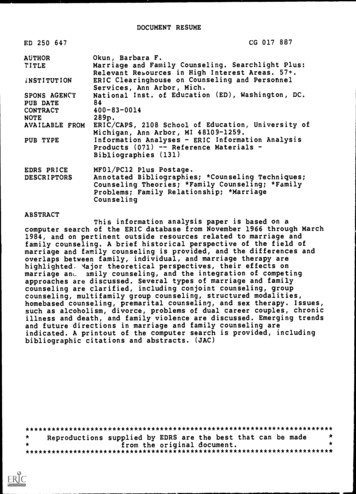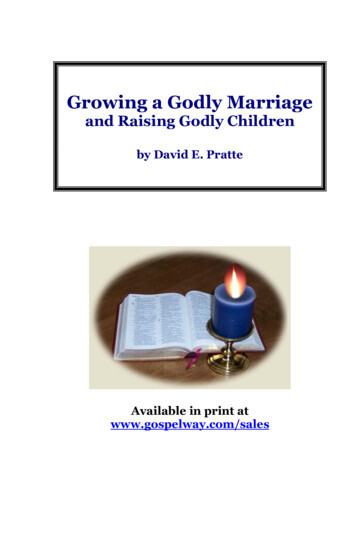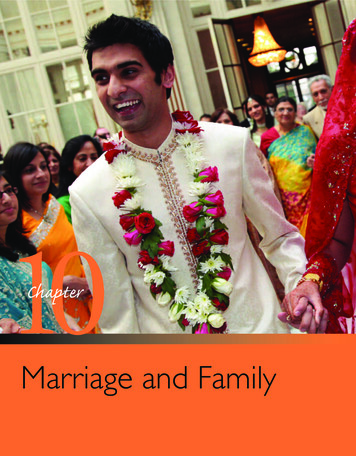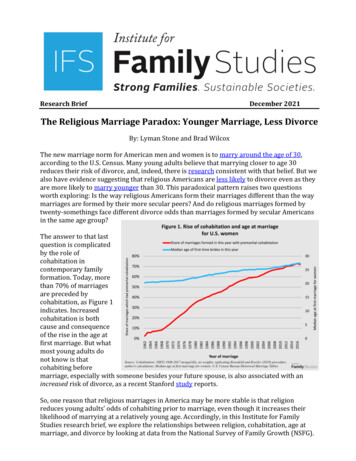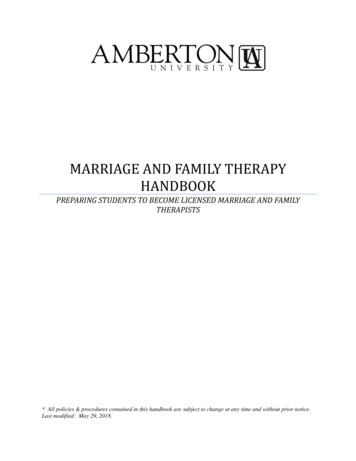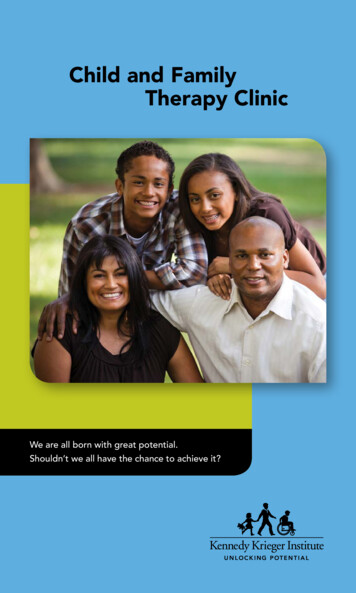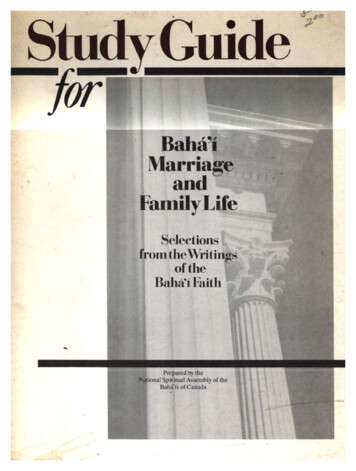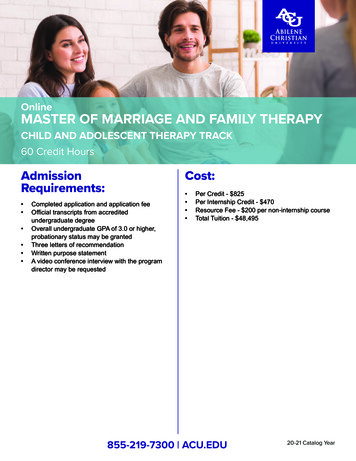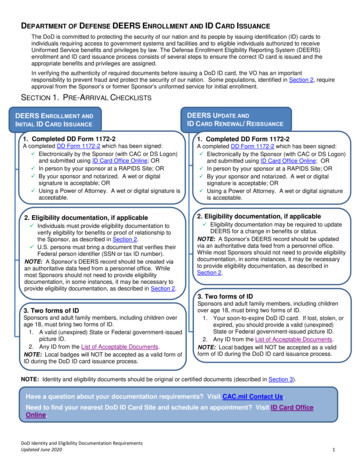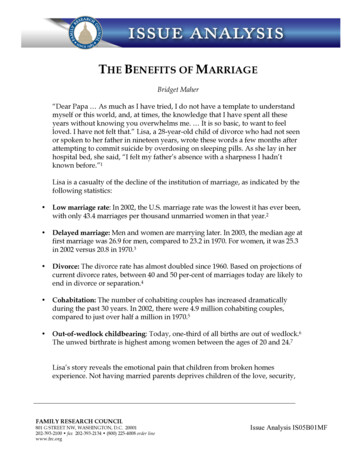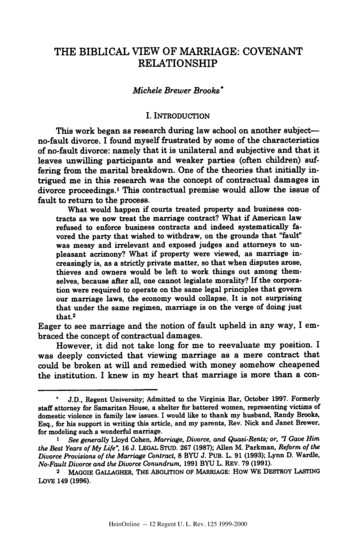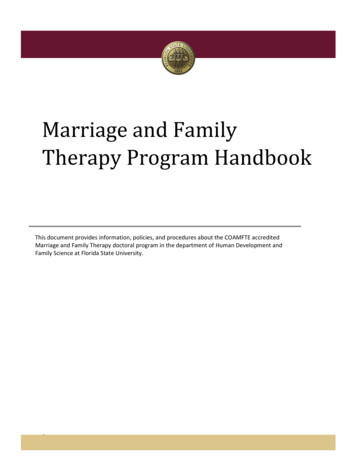
Transcription
Marriage and FamilyTherapy Program HandbookThis document provides information, policies, and procedures about the COAMFTE accreditedMarriage and Family Therapy doctoral program in the department of Human Development andFamily Science at Florida State University.1
MARRIAGE AND FAMILY THERAPYPROGRAM HANDBOOK2021 – 2022Marriage and Family Therapy Program Overview . 4Florida State University Mission . 4Marriage and Family Therapy Program Mission. 4Program Focus . 4MFT Educational Outcomes . 5Program Goals . 5Academic Requirements . 7Standard and Advanced Curriculum . 7Graduates of Non-COAMFTE Master’s Programs . 10Transferring Graduate Credit . 10Scholarly Engagement Requirement . 10Academic Policies and Procedures . 11Program of Study Supervisory Committee . 11Doctoral Portfolio. 12Doctoral Portfolio Rubric . 13Clinical Comprehensive Evaluation . 18Evaluation of the Clinical Comprehensive Examination . 19Preliminary Exam. 21Dissertation. 25Dissertation Research Project. 27Oral Defense Procedure. 28Institutional Review Board (IRB) and Research Involving Human Subjects . 28Clinical Training . 28Overview of Clinical Training . 28Clinical Requirements . 29Clinical Hours Exception Policy . 31Internship – The Advanced Practical Experience Component. 31Clinical Internship Site Requirements . 32Internship Documentation . 32Clinical Internship Supervision . 32Other Internship Considerations . 332
Recommended Timeline for Degree Completion. 33Progress Toward Degree Completion . 34Length of Program and Time Limits for Degree Completion . 34Grading and Assessment. 35Retention . 35Remediation and Dismissal . 35Graduation. 37Academic Standards . 37Academic Conduct . 37Authenticity of Students’ Work . 38Anti-Discrimination Polices . 38MFT Program Climate . 39Complaints and Grievances . 39General Academic Appeals for Student Grievances . 41Grievance Policy and Procedures for Persons with Disabilities. 41Sexual Harassment or Misconduct . 42University and Program Resources . 42Technology Requirements and Technical Training . 43Fees, Charges, and Refund Policies . 44Student Recruitment and Admission . 44Student and Graduate Achievements . 45Program Leadership, Composition, and Roles . 45MFT Program Director . 45CCFT Director . 45CCFT Assistant Director . 45MFT Clinical/Supervisory Faculty . 46CCFT Therapists . 46CCFT Office Staff . 46Annual Student Learning Competency Review. 46Procedures on Student and Alumni Outcome Data Collection . 46Program Governance . 47Portability of Degree . 48Important Links . 493
Marriage and Family Therapy Program OverviewThe Marriage and Family Therapy (MFT) doctoral program at Florida State University isaccredited by the Commission on Accreditation for Marriage and Family Therapy (COAMFTE).The program’s most recent re-accreditation was in 2020; our re-accreditation renewal date isMay 1, 2027.The MFT doctoral program is housed in the Department of Human Development and FamilyScience (HDFS) at Florida State University (FSU). FSU is accredited by the Southern Associationof Colleges and Schools, Commission on Colleges.To promote accuracy and program transparency in publications, in accordance with COAMFTE,this manual has been prepared to provide information about the educational outcomes,policies, procedures, and expectations associated with the MFT doctoral program. Theinformation provided here adds to that which is covered in the Florida State University GeneralBulletin – Graduate Edition, and the Department of Human Development and Family ScienceGraduate Manual.Florida State University MissionFlorida State University preserves, expands, and disseminates knowledge in the sciences,technology, arts, humanities, and professions, while embracing a philosophy of learningstrongly rooted in the traditions of the liberal arts. The university is dedicated to excellence inteaching, research, creative endeavors, and service. The university strives to instill thestrength, skill, and character essential for lifelong learning, personal responsibility, andsustained achievement within a community that fosters free inquiry and embraces diversity.Marriage and Family Therapy Program MissionThe mission of our program is to produce Marriage and Family Therapy (MFT) leaders throughengagement in programmatic research and advanced clinical preparation. The programaddresses family processes and evidence-based relational interventions for today’s diversefamilies. We accomplish the program mission though active and integrated engagement inresearch, teaching, and clinical experiences consistent with professional marriage and familytherapy principles.Program FocusWe address family processes and empirically-supported relational interventions. Our research,clinical, and teaching activities address three areas: 4Relational enhancement in youth, couples, and families;Relational interventions for marginalized and underserved communities;The link between family processes and relational outcomes.
MFT Educational OutcomesProgram Goals1. Graduates will be able to conduct and disseminate relational/systemic research within afocused program of research.2. Graduates will demonstrate advanced, multiculturally-informed, and ethical clinicalpractice competencies and supervision skills to meet the needs of diverse individuals,couples, and families.3. Graduates will demonstrate knowledge and skills of effective teaching in traditional ornon-traditional instructional formats.Program Goal 1: Graduates will be able to conduct and disseminate relational/systemicresearch within a focused program of research.Student Learning Outcome 1.1: Graduates will demonstrate in depth knowledge inresearch methods and statistics relevant to MFT research. Accomplishment will beassessed through the rubrics for the final projects in Intervention Research (FAD6930r),MFT Outcomes Research (FAD6916), and Portfolio ratings on the Developmental Reviewsection, item 2.Benchmark: 80% of students will earn a B or higher on the final projects forIntervention Research and MFT Outcomes Research.Target: 80% of students will earn an evaluative rating of “clear evidence ofresearch progression” on the portfolio Developmental Review section, Part II.Student Learning Outcome 1.2: By graduation, students will submit at least 3 conferencepresentations and 3 manuscripts for publication within a focused and systemic programof research, of which the student will be the lead author on at least of 1 of thosepresentations and 1 publication as evidenced on rating for portfolio items 3 and 4.Benchmark: By graduation, 80% of students will submit at least 3 presentationsand 3 manuscripts for publication, of which the student will be the lead authoron at least of 1 of those presentations and 1 publication.Target: By graduation, 100% of students will submit at least 3 presentations and3 manuscripts for publication, of which the student will be the lead author on atleast of 1 of those presentations and 1 publication.Student Learning Outcome 1.3: Students will produce a draft of a grant applicationrelevant to their area of research. The student’s committee, via item 2 on the studentportfolio, will indicate accomplishment of this SLO.Benchmark: By graduation, 80% of students will produce a draft of a grantapplication relevant to their area of research.Target: By graduation, 100% of students will produce a draft of a grantapplication relevant to their area of research.5
Program Goal 2: Graduates will demonstrate advanced, multiculturally-informed, and ethicalclinical practice competencies and supervision skills in meeting the needs of diverseindividuals, couples, and families.Student Learning Outcome 2.1: Students will gain advanced, mentored clinicalexperiences and demonstrate behaviors of ethical practice and cultural sensitivityconsistent with the COAMFTE requirements and the American Association for Marriageand Family Therapy Code of Ethics. Accomplishment will be assessed through thePracticum (FAD6940) evaluation criteria rubrics, the Internship (FAD8944) finalevaluation criteria rubric, and item #10 on the student’s portfolio.Benchmark: Benchmark: 80% of students will meet or exceed expectations onannual evaluations on item #10 on the student’s portfolio.Target: Target: 100% of students will meet or exceed expectations on annualevaluations on item #10 on the student’s portfolio.Student Learning Outcome 2.2: Students will demonstrate knowledge of core MFTclinical competencies through either successfully passing the Association of Marital andFamily Therapy Regulatory Boards (AMFTRB) national or practice exam.Accomplishment of this SLO will be assessed upon admission to MFT Internship(FAD8944).Benchmark: 80% of students will successfully pass the AMFTRB exam.Target: 100% of students will successfully pass the AMFTRB exam.Student Learning Outcome 2.3: Students will develop a specialized clinical area that isgrounded in research and is at an advanced level of intervention and understanding.Accomplishment of this will be assessed via the rubric for Advanced Clinical Theory finalproject.Benchmark: 80% of students will earn a B or higher on the final project forAdvanced MFT Theory (FAD6930r).Target: 100% of students will earn a B or higher on the final project for AdvancedClinical MFT Theory (FAD6930r).Student Learning Outcome 2.4: Students will demonstrate supervision skills consistentwith professional marriage and family therapy principles through successfullycompleting the supervision philosophy assignment and case presentation assignmentsin Supervision in MFT (FAD6606) with Bs or higher.Benchmark: 80% of students will successfully complete the supervisionphilosophy assignment and case presentation assignments in Supervision in MFT(FAD6606) with Bs or higher.6
Target: 100% of students will successfully complete the supervision philosophyassignment and case presentation assignments in Supervision in MFT (FAD6606)with Bs or higher.Program Goal 3: Graduates will demonstrate knowledge and skills of effective teaching intraditional or non-traditional instructional formats.Student Learning Outcome 3.1: Students will successfully complete a college teachingcourse (FAD5481r, College Teaching in Family Science) and supervised teachingexperience (FAD5942r, Supervised College Teaching). Accomplishment of this SLO willbe assessed from student transcripts.Benchmark: 80% of students will successfully complete College Teaching andSupervised College Teaching with a grade of satisfactory.Target: 100% of students will successfully complete College Teaching andSupervised College Teaching with a grade of satisfactory.Student Learning Outcome 3.2: Students will successfully teach at least oneundergraduate course in a traditional or online format and in doing so will demonstrateknowledge and skills of effective teaching in traditional or non-traditional instructionalformats. Accomplishment of this SLO will be determined by evaluations of “meets” or“exceeds expectations” on Item 6 of the Student Portfolio.Benchmark: By graduation, 80% of students will meet or exceed expectations onItem 6 of the Student Portfolio.Target: By graduation, 100% of students will meet or exceed expectations onItem 6 of the Student Portfolio.Academic RequirementsStandard and Advanced CurriculumStudents are referred to the Department of Human Development and Family Science GraduateManual (found here: 2.pdf) for a detaileddescription of curricula requirements. Graduates from Commission on Accreditation inMarriage and Family Therapy Education (COAMFTE) accredited programs will have met theFoundational Curriculum and will take requisite course for the COAMFTE Advanced Curriculum.Graduates from Master’s programs not accredited by the COAMFTE must complete theFoundational Curriculum. The program director will review transcripts of students from nonaccredited programs to determine what additional coursework is required. Students canrequest to count Master’s level courses toward the Foundational Curriculum requirements. Todo so, students must complete a course substitution form available from the program director7
and attach syllabi. The program director will review these materials and determine whichcourses may be counted toward the Foundational Curriculum. No Foundational Curriculumcourse will be waived. Students must complete the Foundational Curriculum before taking thepreliminary doctoral examination.Students will prepare an initial Program of Study by the middle of their first semester thatincludes the additional required courses which may not be counted toward meeting therequired minimum credit hours for the doctoral degree. The curriculum is designed andsequenced to be consistent with the program’s mission, goals, and outcomes and COAMFTEProfessional Marriage and Family Therapy Principles. Table 1 displays alignment between theAdvanced Curricular Requirements, Practice of Marriage and Family Therapy Principles(PMFTPs) and Core Competencies, and the program’s minimum course requirements.Table 1. FSU COAMFTE Advanced Doctoral Curriculum Didactic RequirementsAdvanced CurriculumCore CompetenciesMinimum CourseRequirementsACA 1 - Advanced Research*some courses shared with ACA 3Domain 2 - Clinical Assessment andDiagnosisDomain 4 - Therapeutic InterventionsDomain 6 - Research and ProgramEvaluationDomain 4 - Therapeutic InterventionsFAD 6706 - Intervention ResearchFAD 6916 - MFT OutcomeResearchACA 2 - Advanced Relational/Systemic Clinical Theory*some courses shared with ACA 3ACA 3 - Advanced Relational/Systemic Applications toContemporary Challenges*some courses shared withACA 1 or ACA 2ACA 4 - Foundations of Relational/Systemic Teaching, Supervision,Consultation, and/orLeadershipDomain 1 – Admission to TreatmentDomain 2 - Clinical Assessment andDiagnosisDomain 3 – Treatment Planning andCase ManagementDomain 4 - Therapeutic InterventionsDomain 5 - Legal Issues, Ethics, andStandardsDomain 6 - Research and ProgramEvaluationDomain 4 - Therapeutic InterventionsDomain 5 – Legal Issues, Ethics, andStandardsOther Curricular RequirementsDoctoral level skills8FAD 6605 – Advanced ClinicalMFT TheoryFAD 6930r – MFT Social Justiceand DiversityFAD 6940 - PracticumFAD 8944 - InternshipFAD 5481 - College TeachingFAD 6606 - Supervision in MFTMinimum RequirementsDomain 6 - Research and ProgramEvaluationHOE 6366 - Research BestPracticesCHD 5617 - Professional Dev.CHD 5915 - Methods of ResearchFAD 5700 - Applied ResearchFAD 5942 - Supervised TeachingFAD 5705 - Qualitative MethodsFAD 6917 - Research MethodsFAD 6980 - Dissertation
The Ph.D. degree program in Marriage and Family Therapy (MFT) requires a minimum of 85credit hours of which 21 are clinical/supervision and 24 are dissertation. A Program of Study isdeveloped in consultation with and approved by the Supervisory Committee; these must befiled within the first two semesters of enrollment in the program.Required Core Courses:HOE 6366Research Best Practices in Human SciencesCHD 5617Professional Development in FCSFAD 5481College Teaching in Family SciencesFAD 5942Supervised TeachingFAD 6916Outcome Research in MFTFAD 6605Advanced Clinical MFT TheoryFAD 6930rMFT Social Justice and Diversity15-18 credit hours212-31-3333Required Research and Statistics:CHD 5915Methods of Research IFAD 5700Applied Research in Human SciencesFAD 5705Qualitative Methods in FCSFAD 6917Research Methods in FCSFAD 6706Intervention ResearchFAD 8964rPreliminary Doctoral ExamFAD 6980rDissertationFAD 8985rDissertation Defense Examination41 credit hours443330240Research and Data Analytic Electives – Examples:FAD 6608Effectiveness and Translation Research in MFTCOM 5317Content Analysis in Communication ResearchEDF 5402Adv. Topics in Analysis of Variance Apps.EDF 5406Multivariate Analysis ApplicationsEDF 5409Causal ModelingEDF 5410Nonparametric Analysis ApplicationsFAD 6935rDyadic Data AnalysisFAD 6935rLongitudinal AnalysisClinical Practice Requirements:FAD 6606Supervision in MFTFAD 6940rPracticum in MFTFAD 8944rInternship in MFT3 credit hours3333333321 credit hours3126Elective Courses – Examples:CHD 5266Advanced Child DevelopmentCHD 5919Grant Writing in FCSFAD 5263Advanced Family StudiesFAD 5906rDirected Individual Study (topics vary)5 credit hours3331-3TOTAL MINIMUM (includes 24 credits for dissertation)985
Graduates of Non-COAMFTE Master’s ProgramsGraduates from MFT Master’s programs not accredited by the COAMFTE must complete theFoundational Curriculum. The program director will review transcripts of students from nonaccredited programs to determine what additional coursework is required. Students canrequest to count Master’s level courses toward the Foundational Curriculum requirements. Todo so, students must complete the non-accredited program worksheet available from theProgram Director and attach syllabi. The program director will review these materials anddetermine which courses may be counted toward the Foundational Curriculum. NoFoundational Curriculum course will be waived. Students will then prepare an initial Program ofStudy by the middle of their first semester that includes the additional required courses whichmay not be counted toward meeting the required minimum credit hours for the doctoraldegree. Students must complete the Foundational Curriculum before taking the preliminarydoctoral examination. There are additional clinical requirements and those are detailed in theClinical Training section of this handbook.Transferring Graduate CreditIn cases where a graduate student is transferring to our graduate program, the student mayrequest to transfer some graduate credit. Specifically, if graduate courses taken from anotherinstitution were not counted toward a previous degree and the student earned a “B” or better,the student may request courses to be posted to his/her FSU transcript. The college limit ontransfer credits is 6 hours. These courses will not count toward fulfilling minimum credit hourrequirements or count in their GPA calculation. If the student earned a master’s degree, theuniversity requires the doctoral student to complete residency (24 hours in a 12-month period),pass the preliminary exam, take a minimum of 24 dissertation hours, and pass the dissertationdefense. In addition, the college requires at least 6 summer hours be taken from the college.If the content covered in the graduate course taken outside HDFS is similar to contentaddressed in an HDFS required course, as evidenced by the course syllabus and any otherrequested documentation, the student may request that the course substitute for an HDFSrequired course. To do this, the student should present the syllabus and any other supportingdocumentation to their committee chair. If the committee chair agrees the content is similar,the request is then brought to the student’s committee for approval. If approved, the studentwill prepare a POS that reflects the approved substitution.To transfer credits, students are encouraged to schedule a meeting with the GraduateAcademic Program Specialist or Assistant (i.e., Tara Hartman or Mary-Sue McLemore) to discussthe steps required to transfer credits. All decisions about transfer of credits and substitutionsare made on a case-by case basis. These requests are to be submitted before the end of thestudent’s first semester of HDFS graduate studies.Scholarly Engagement RequirementPlease consult the current Florida State University (FSU) Graduate Bulletin for an overview ofthe Scholarly Engagement requirement for all FSU doctoral students. To meet the ScholarlyEngagement requirement, doctoral students in the Department of Human Development andFamily Science must submit evidence of Scholarly Engagement via the doctoral portfolio annual10
evaluation system. These activities may include presenting at conferences, preparingpublishable manuscripts, submitting grant applications, and other scholarly work determined asappropriate by the student’s committee. Attending departmental and college guest lecturesalso is expected. Students are required to fulfill scholarly requirements each year. An actionplan will be developed by the student’s supervisory committee in instances when a studentdoes not meet this requirement as indicated by an annual evaluation summary that is below“satisfactory.” The action plan will enumerate measurable benchmarks that must becompleted by the student during the next academic year in order to achieve a satisfactoryrating and consequences if those benchmarks are not achieved. This action plan will be signedby the student and major professor. If the benchmarks are not completed the followingacademic year, the student will not be allowed to progress to the next stage of the degree (e.g.,sit for the preliminary exam, prospectus or dissertation defense) until concerns are resolvedand benchmarks achieved.Academic Policies and ProceduresProgram of Study Supervisory CommitteeUpon acceptance into the program, all graduate students are assigned a temporary advisor atthe beginning of the academic year. During the first academic year, students are expected toidentify a major professor.Students must have a major professor from within the department and at least 4 committeemembers, 3 from the Department and 1 from a college other than the College of Health andHuman Sciences. The outside member serves as the University Representative. For MFTstudents, 1 of the required departmental members must be designated as MFT clinical faculty.The MFT faculty representative does not have to be the student’s major professor. Allcommittee members must hold appropriate Graduate Faculty Status.The major professor assists the student in identifying potential members of the Program ofStudy Supervisory Committee. It is the responsibility of the student to secure agreement fromeach member and complete the necessary form designating the constituency of the Program ofStudy Supervisory Committee. This form is submitted to the major professor, DepartmentChair, and the Associate Dean for Research and Graduate Studies for approval no later thanprior to registration for the third semester. Students will not be allowed to register for theirthird semester if the Program of Study Supervisory Committee form is not on file in the Officeof the Associate Dean for Research and Graduate Studies in the College of Health and HumanSciences. Members of the Program of Study Supervisory Committee should be chosen for theirpotential contribution to the selection of appropriate content of study required to prepare thestudents for their professional goals.Supervisory Committees vary on how they prefer to approve the Program of Study. Somemajor professors and committee members prefer a face-to-face meeting of all members andthe student to discuss the Program of Study and determine the fit between what is proposed11
and the student’s professional goals. Other committees prefer to provide approval withoutsuch a meeting. The major professor is expected to provide leadership in the process.Doctoral PortfolioA requirement for receiving the Ph.D. in HDFS is the completion of the Ph.D. StudentGraduation Portfolio. The portfolio covers the domain
Marriage and Family Therapy Program Overview The Marriage and Family Therapy (MFT) doctoral program at Florida State University is accredited by the Commission on Accreditation for Marriage and Family Therapy (COAMFTE). The program’s most recent re-accreditation was i
